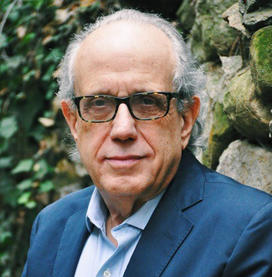Paul Boorstin ’65 Offers a Fresh Take on a Classic Biblical Tale

The book: After being discovered by Philistine priests, Nara — a woman of remarkable height and strength —is promised to Goliath so that they might produce warrior offspring. But this classic tale is turned on its head when her fate collides with David's, her betrothed's destined foe. With the pace of a thriller, Boorstin, a longtime screenwriter, vividly reimagines the struggles of the characters he’s borrowed from the Bible. David and the Philistine Woman (Top Hat Books), like so many Biblical stories, carries with it a message of humanity, sacrifice, and the importance of compassion.

Opening: Through the tips of his fingers, the warning came.
The taut strands of sheep sinew allowed David to sense what would take place before his eyes could see it or his ears could hear. Sometimes there was a sweetness in the notes, like turtledoves at dawn, which filled him with hope. At other times, the notes stung like thorns, announcing that a dust storm was brewing or that a pack of wolves had cornered a ram in a ravine.
In the unforgiving heat of the day, he watched over the sheep grazing on the hillside near Bethlehem and ran his hand along the strings of his lyre. The notes hovered uncertainly in the air to foretell something looming over the horizon. He sensed a mighty force, though whether for good or evil, he did not know.
He lifted his fingers from the strings and rested the cedar yoke of the lyre on his knee. All his life, he had waited for the Almighty to speak to him. He had listened for His voice on the wind and in the gruff crackling of the hearth fire. He had listened for Him in the roll of thunder and in the chirping of crickets. He had never heard Him.
And yet, for days, David had sensed that something momentous was about to take place. Only the night before, he had the dream, the one that had haunted him for as long as he could remember.
In the dead of night, he was standing outside a cave. He knew that a treasure was hidden inside it, but a giant boulder sealed the cave mouth shut so that the treasure was beyond his reach. Then, as he watched, by some unearthly force, the giant boulder began to move, revealing a glow from within the cave like a secret promise. From the unseen source of the radiance, he heard a voice speaking with solemn authority, but the words were muffled. Before he could understand their meaning, he awoke.
The vision of the cave had come to David on so many nights, he doubted he would ever understand its meaning. But last night, it had been more vivid than ever. When he awoke, his heart was pounding, whether from excitement or terror, he could not say.
The dream told him that this day would be like no other. And so, that morning, he allowed fate to guide him. Usually, he led the flock, but today he followed them. It was the way of the sheep to trail after the oldest ram, even if it was senile and useless, and today the flock followed a lame old one with yellow horns warped by time. So it is with my people, he thought. The Israelites follow the ancient paths, while a young leader could guide them in a bold new direction.
At first, the sheep moved as they always did, from the darkness into the light, leaving behind the shadowy ravines near home and setting out for the sunshine of familiar pastures. But today, he noticed they ignored the path of the feeble ram. Left to themselves, they did not proceed north toward Saul’s city of Gibeah, where there was water from streams and ample pasture. Instead, the flock veered west, past Beth-zur, almost as far as Sochoh. He followed the flock of thirty ragged wanderers as they picked their way over the flinty hills.
Keeping an eye out for stragglers among the thornbushes and thistles, he realized they had strayed dangerously close to Philistine territory. David had hoped the sheep would be guided by the Almighty to a place where he would receive a sign. Instead, they had led him to a desolate spot with more nettles than grass, a brackish rivulet for a stream and one miserly terebinth tree that gave no shade. My sheep are lucky that I watch over them, he thought. Left to their own instincts, they would all starve to death.
But what if I am wrong? What if they were led here by a Higher Wisdom beyond my understanding?
Perhaps, here, in this desolation, he would hear the voice of the Almighty at last. He held his breath and listened: only the wind.
Reviews: Jim Calio of The Huffington Post calls David and the Philistine Woman “A powerful and inspirational novel that remains faithful to the spirit of the Biblical original, yet reads like a thriller."











No responses yet